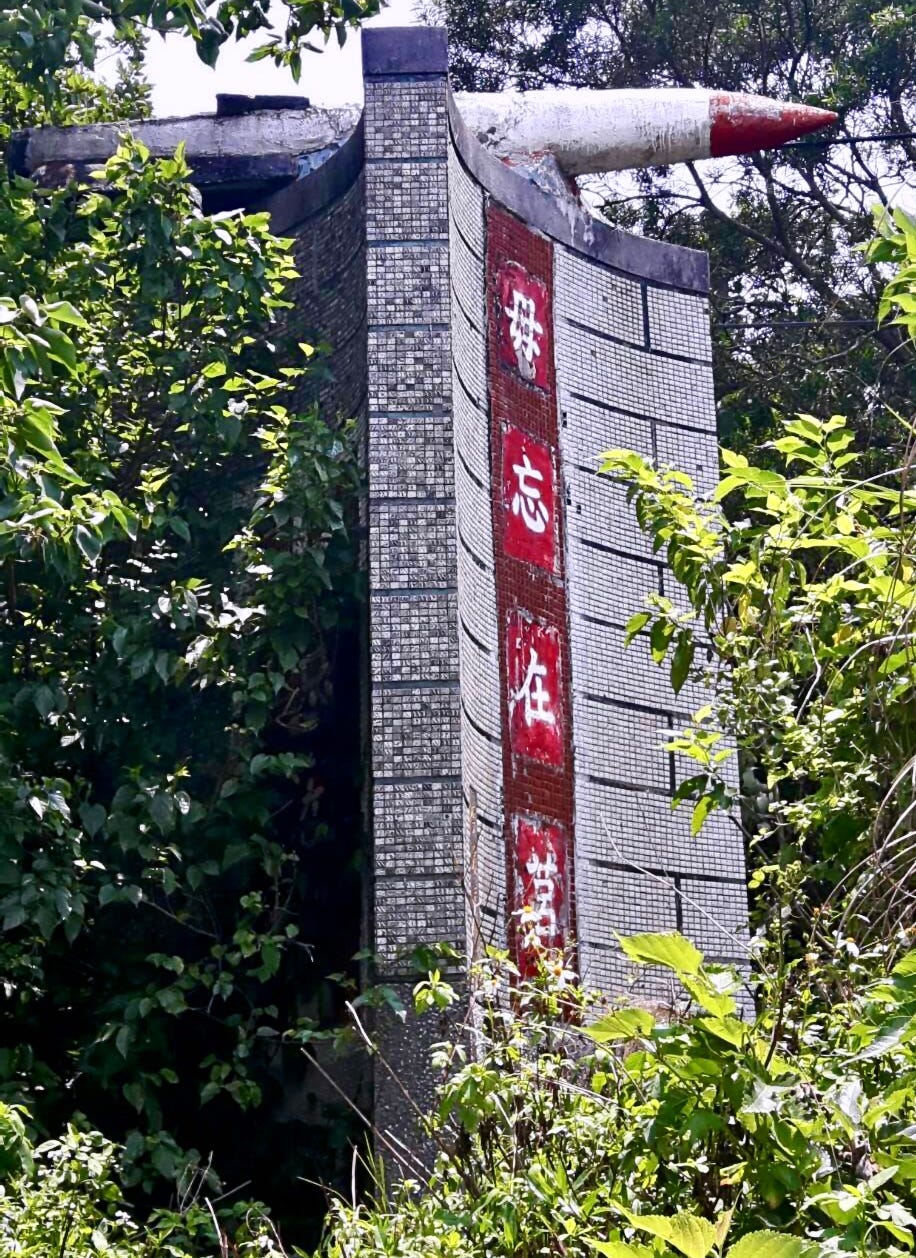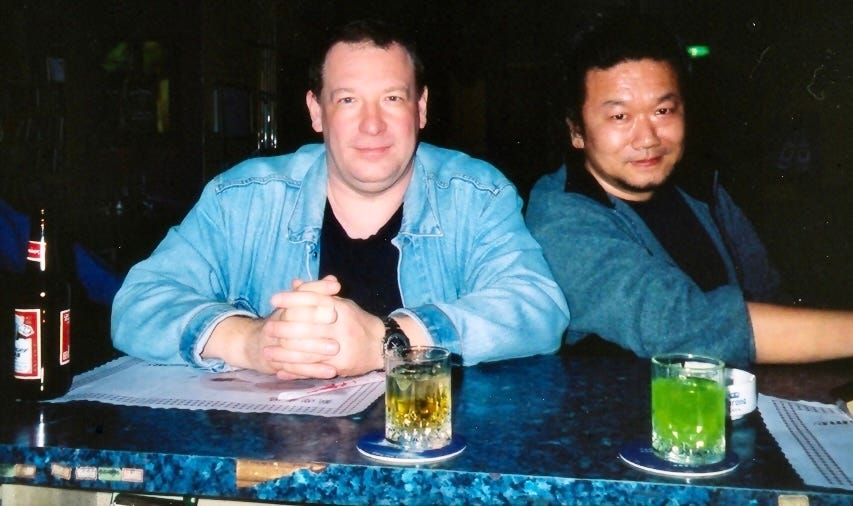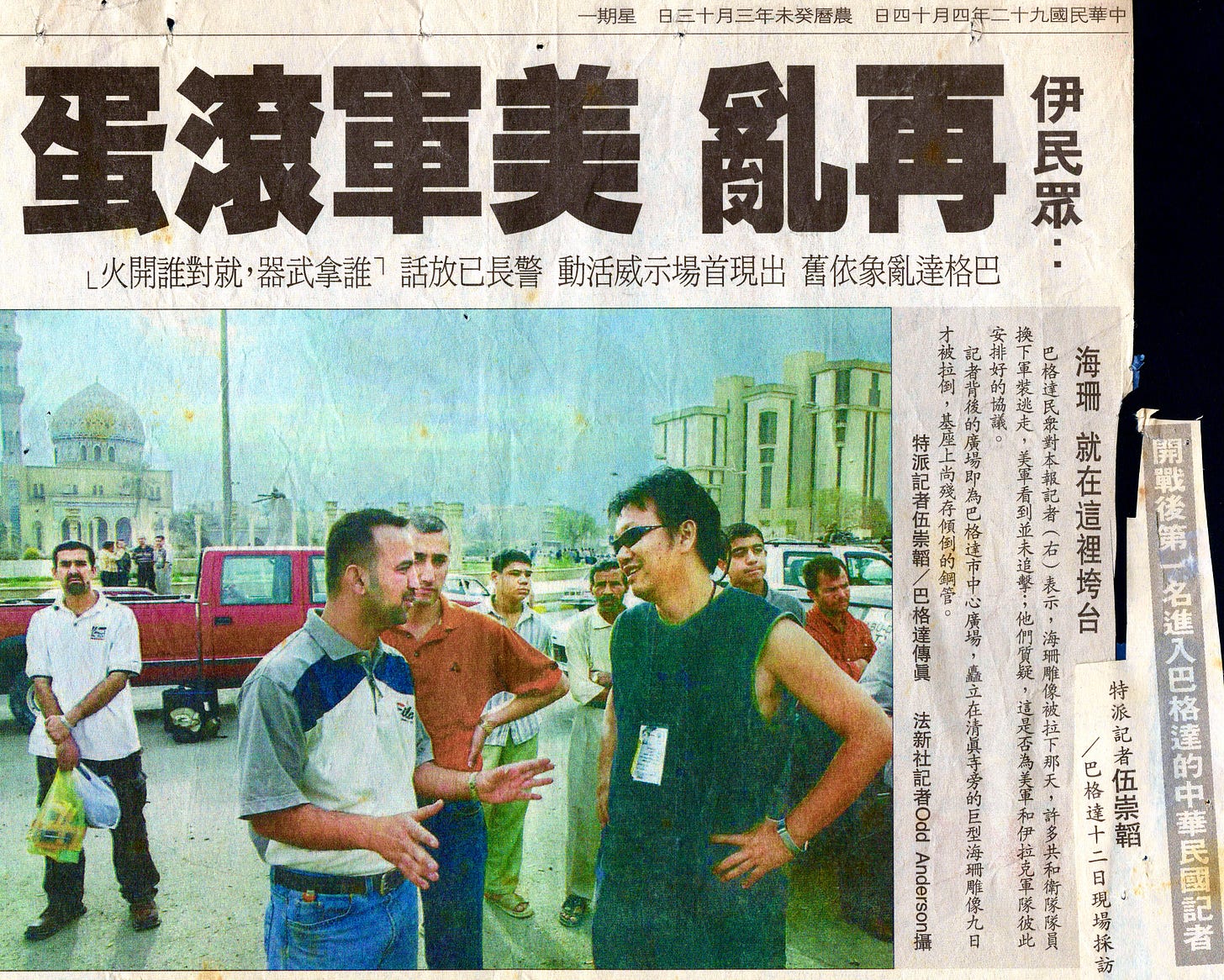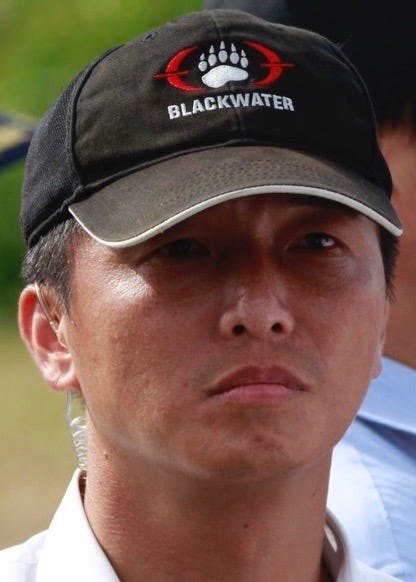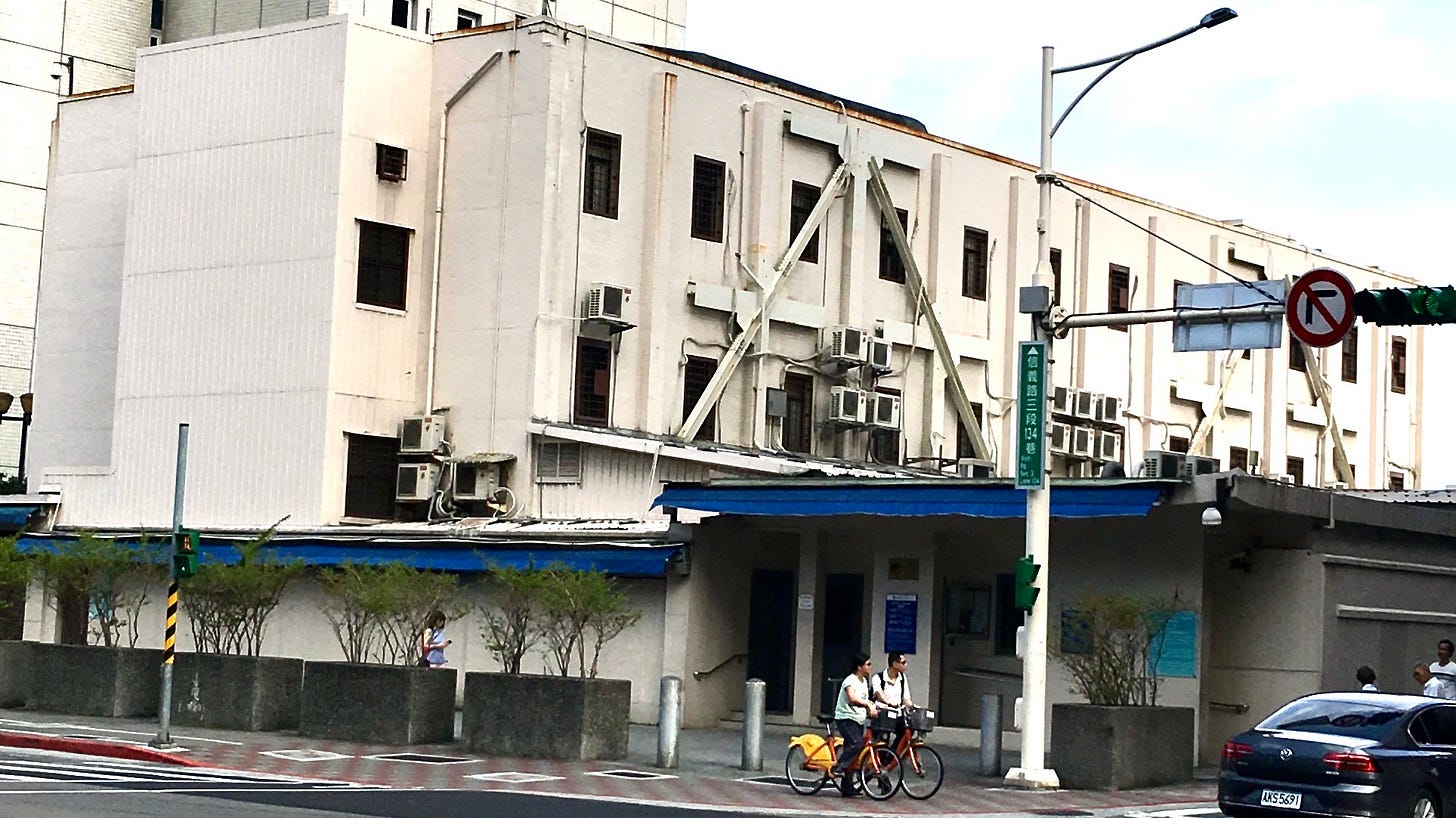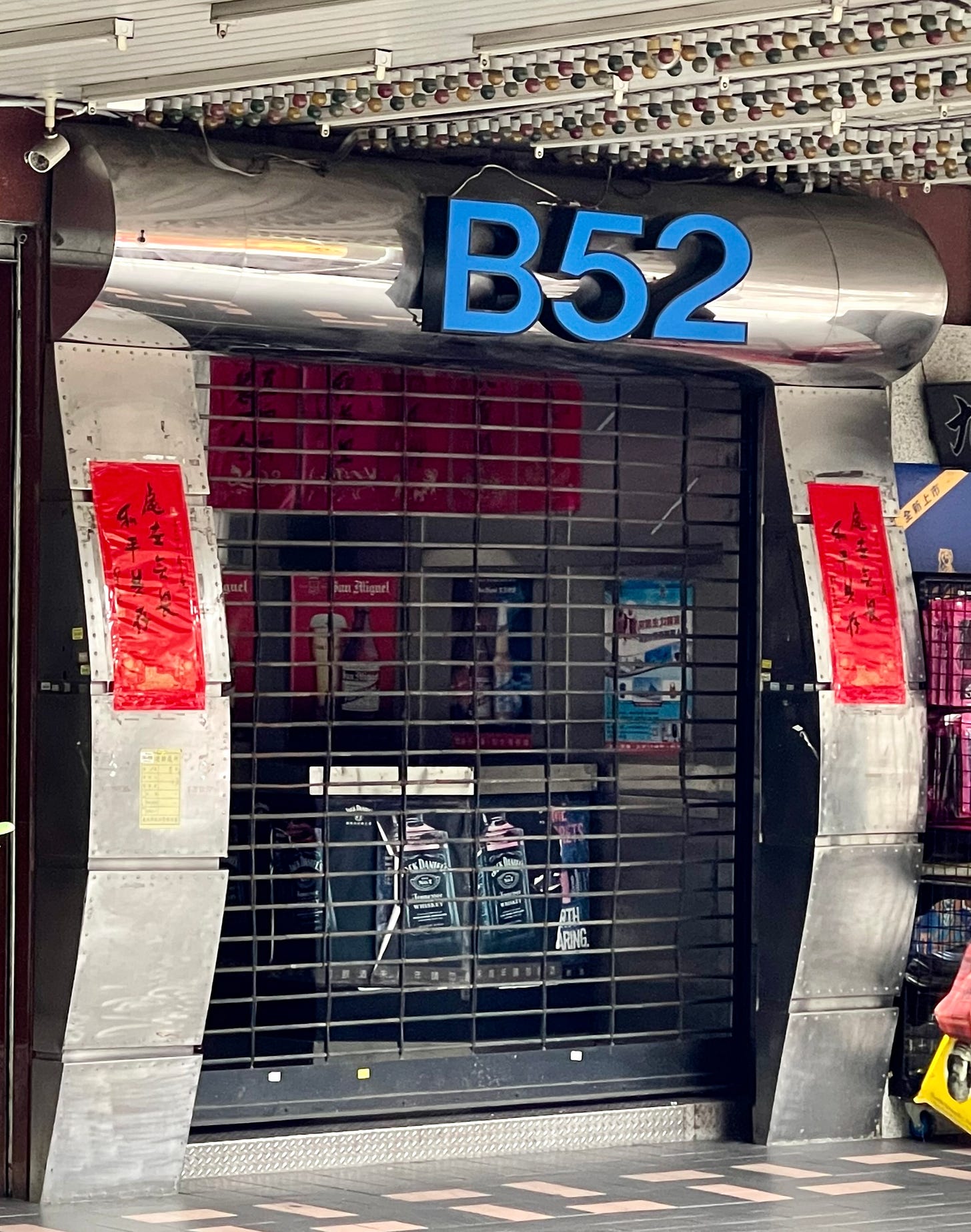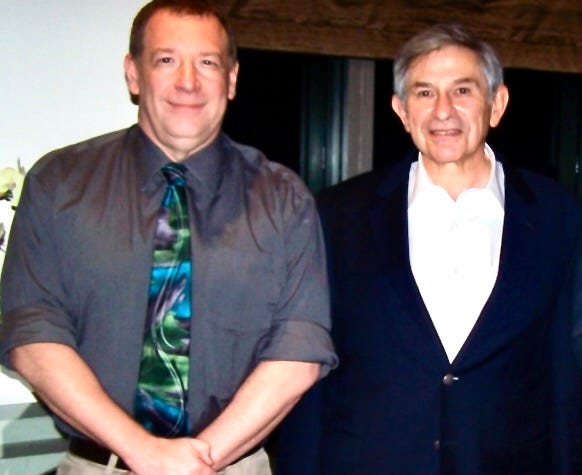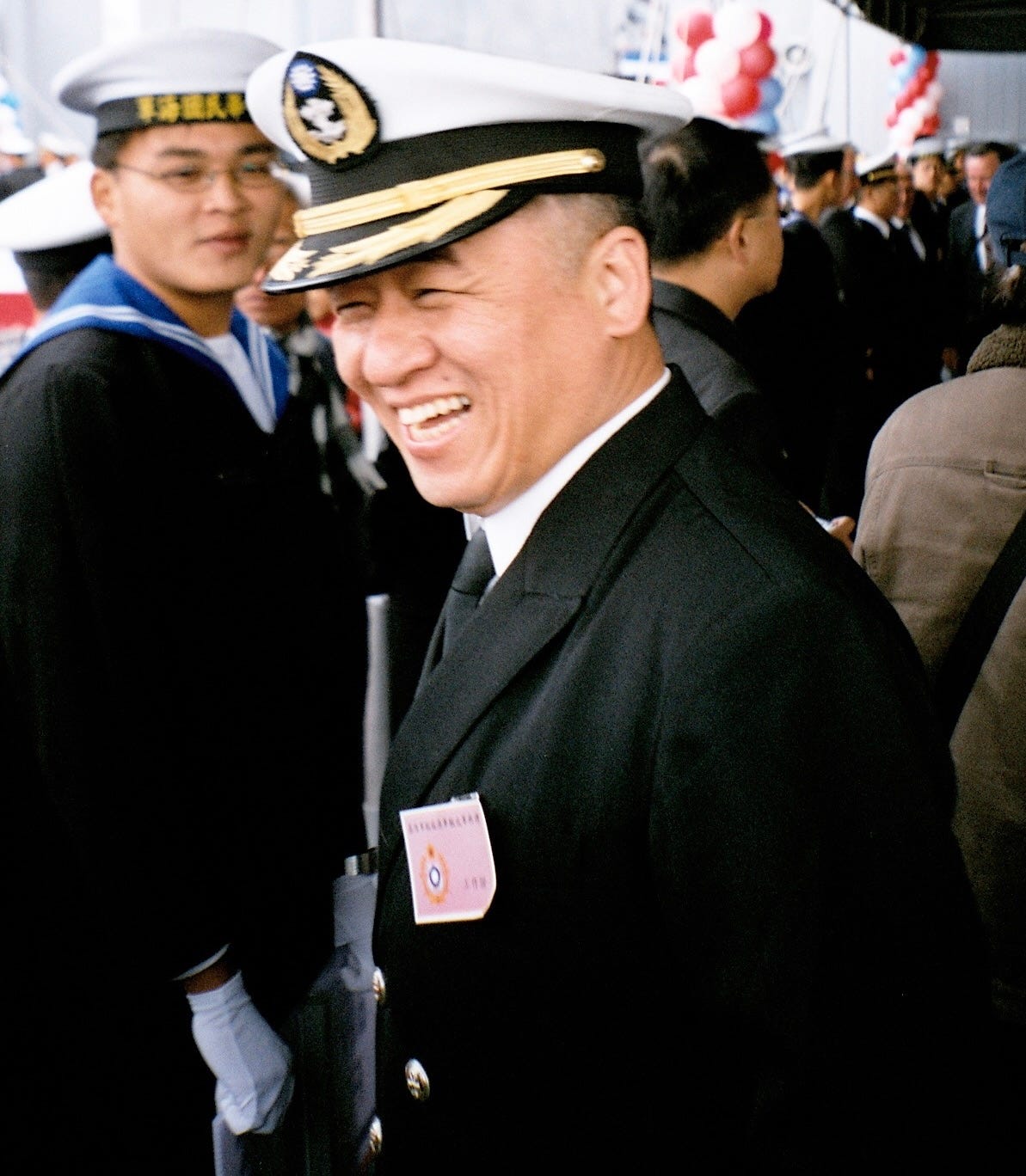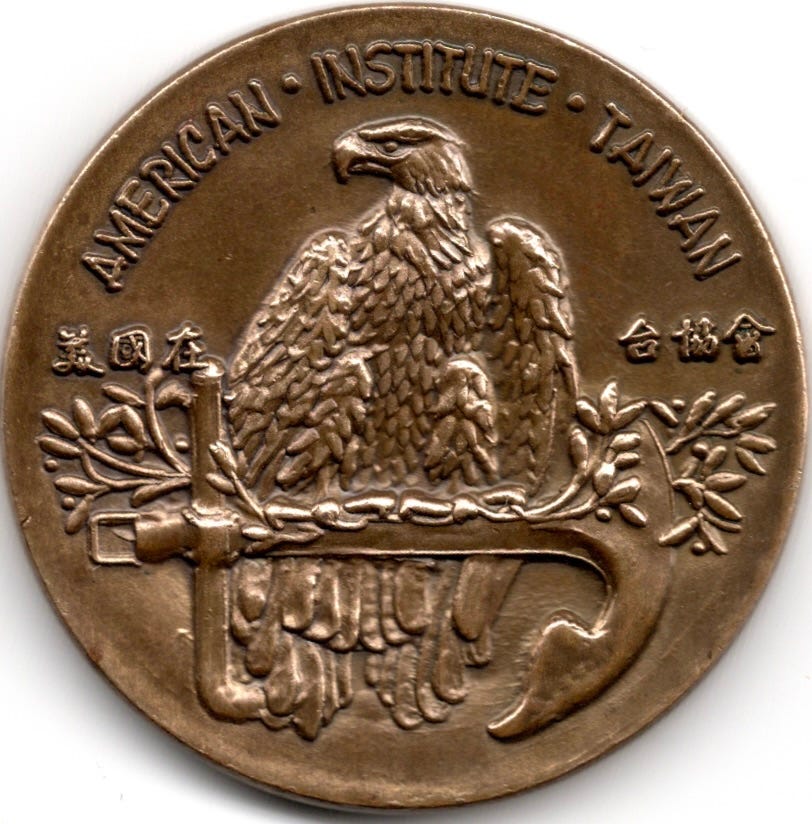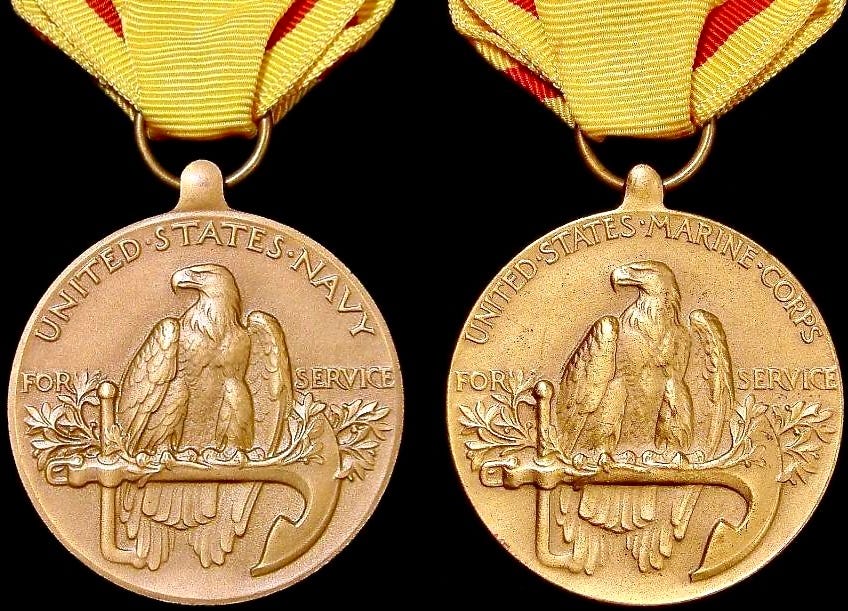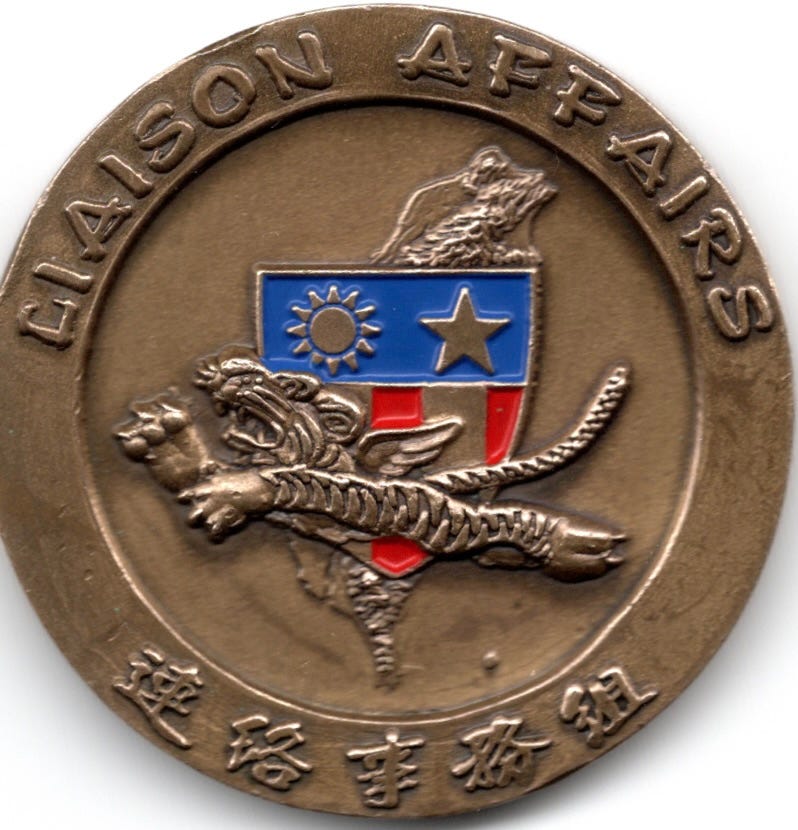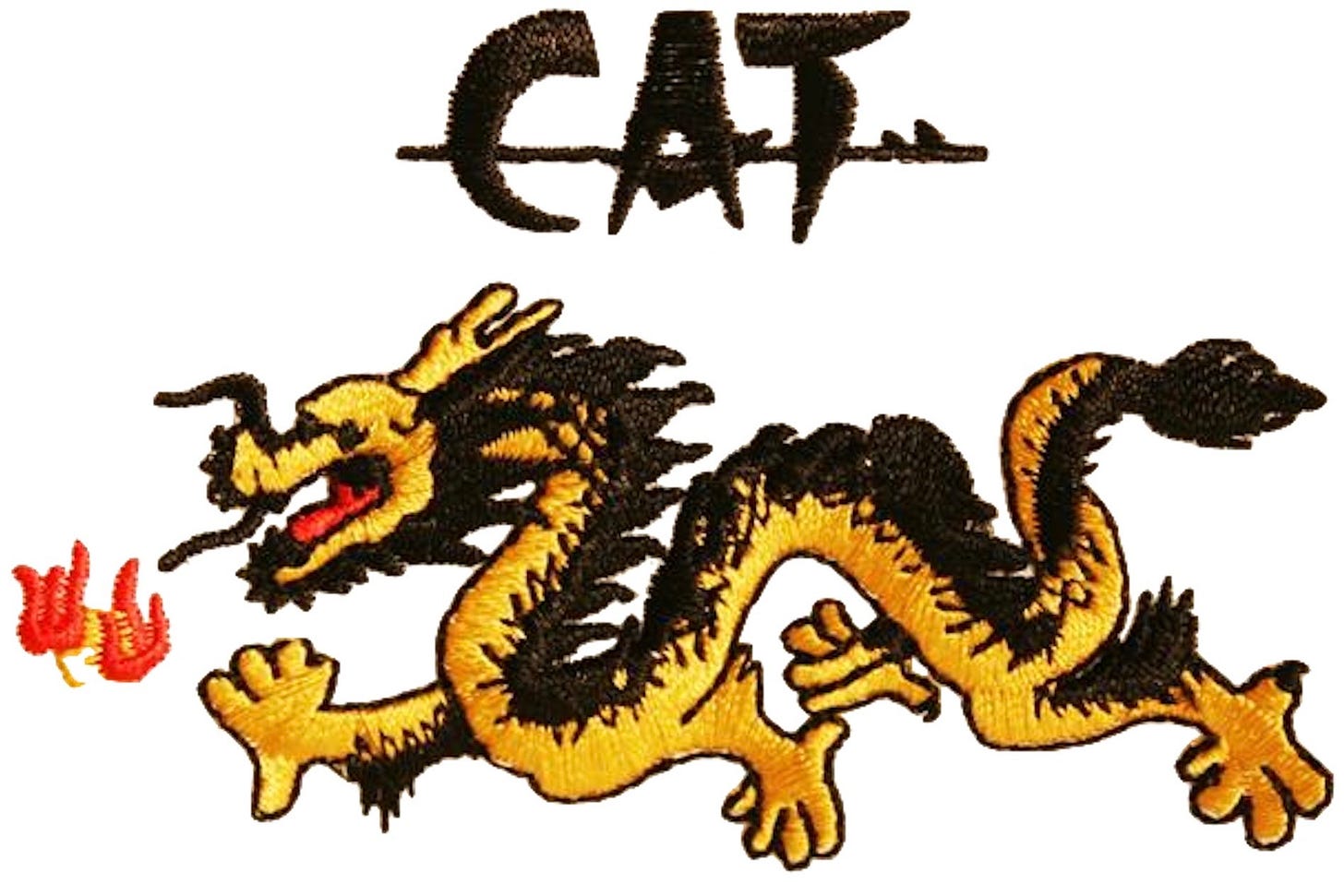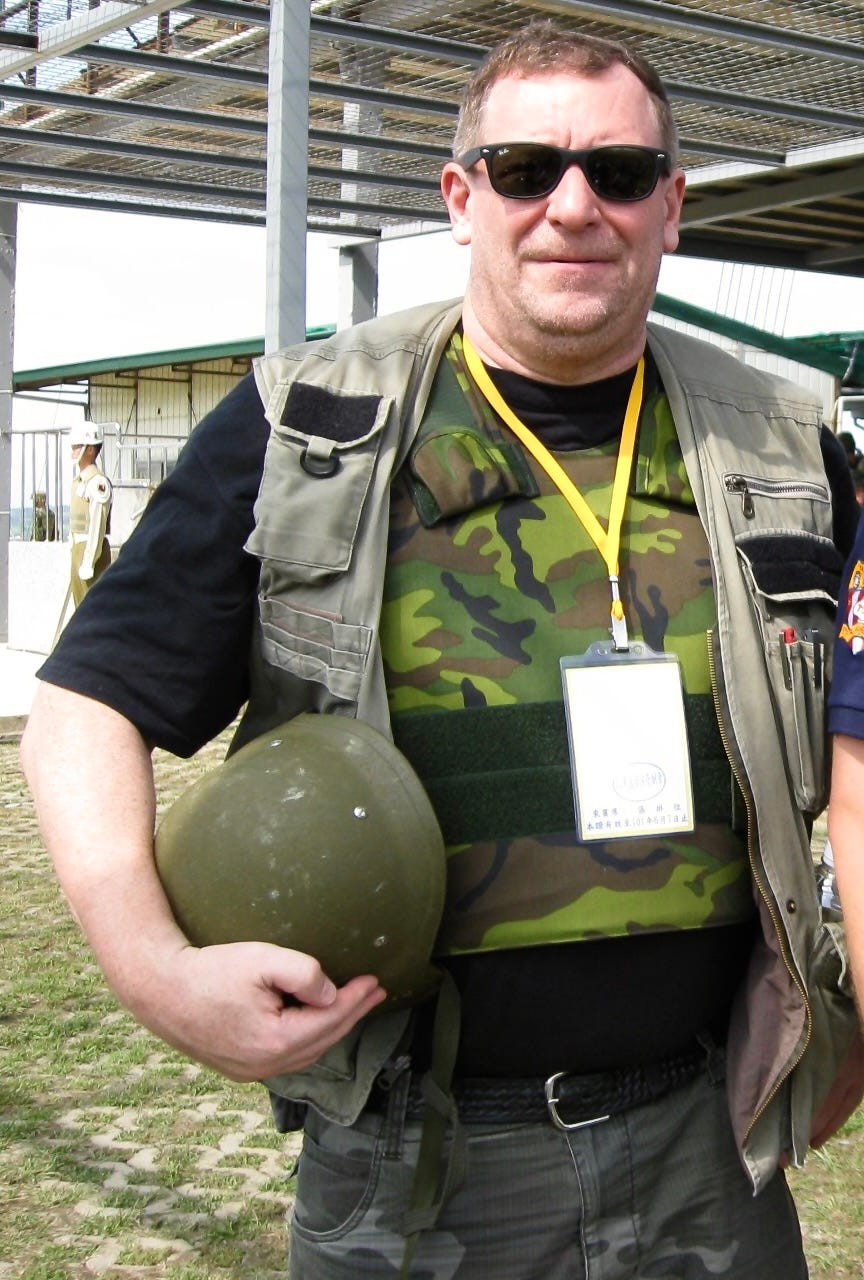Please first read PART ONE of BIG TROUBLE IN LITTLE CHINA.
China In Arms BOOKSTORE and GIFT SHOP!
Twitter and YouTube Page and LinkedIn
Subscribe: $5 Month or $30 Annual.
24 July 2022
Part Two: Big Trouble In Little China:
The Rise and Fall of a Cabal
“The rest of us recognized the danger…of the endless envy of those not blessed. We must not remind them that giants walk the earth.” - Frank Miller, Batman: The Dark Knight Returns (1986).
TAIPEI - Since taking the job in 1997, Stokes became a man possessed over Taiwan and the $18 billion dollar arms deal in 2001 gave him every reason to believe Taiwan had a chance. Stokes wanted to turn Taiwan into the mouse that roared.
Taiwan had survived martial law to become the first Chinese democracy in history. The transition slowly defanged, emasculated, humiliated the military over the years, but U.S. military equipment, training, and the right nudge in U.S. policy, Taiwan could serve as the ultimate bulwark against China’s rising military hegemony, so Stokes believed.
The return of Taiwan’s old nicknames, Fortress Formosa and an Unsinkable Aircraft Carrier, were unlikely. But the cabal hoped to stop the death spiral of Taiwan’s military in time to save it from a Chinese invasion. The military was a shadow of its former self:
Abandoned missile base. Author Photo.
Others joined him on the quest - Dan Blumenthal and Randy Schriver. Together they quickly wove a network of U.S. and Taiwan powerbrokers, outliers, and journalists. Some spooky, some ordinary, some kooky, but all dedicated to keeping China’s claws off Taiwan.

The most unlikely member of the cabal was a local journalist working for the United Daily News. Wu Chung-tao (Wuster) was the guy the newspaper sent to the dark corners of Asia to cover wars, natural disasters, massacres, including the Cambodian civil war and later the 2003 Iraq invasion.
Wuster was not a man, but an event.
A war correspondent who did not mind shooting back; a brother amongst the Bamboo Union, but not a member; when the safety was off, Wuster was a man with hair-trigger violent tendencies.
He chewed betel nut like it was bubble gum; spitting red juice into an empty coffee mug. The betel nut babes all knew his name; whipping off the road nearly crashing into one of the stalls, the girls would always scream “Mr. Wu!” and laugh.
Above: Wendell Minnick and Wuster in the Patina Lounge in the Combat Zone in the early 2000s. Author photo.
With a cigarette hanging from his mouth, he was easy to spot in any bar: khaki shorts, sandals, scruffy beard, sleeveless t-shirt. As cover and camouflage it was both confusing and genius. He went to wars dressed this way, but with added Oakley sunglasses. No combat boots, no bullet proof vest, no helmet. God knows what the Khmer Rouge thought of him.
Despite his gritty appearance, his brain was a machine greased for lightening counter-arguments. Alcohol never seemed to bother his critical thinking skills. Wuster provided an understanding of the dark side of Taiwan politics, often in a Jungian-way. If Carl Jung slept with a loaded pistol by his bed, Wuster knew exactly why.
Wuster was a devil’s advocate that scared Satan himself.
There was a certain kismet and camaraderie surrounding Stokes during his tenure. He was only a Major, the lowest field officer rank in the U.S. Air Force, but had a good-humored, slightly trickster, personality that softened critics.
The Combat Zone became a base of operations for Stokes. In this pathetic, unpredictable red light district, Stokes formed a cabal to meet and conspire on how to reverse U.S. defense policy in place since 1979.
Decades of placating China’s every whim made Taiwan an annoyance to pro-China apologists in the State Department. Taiwan was a festering pus-filled boil on the State Department’s ass; this despite the island’s migration from a despotic dictatorship to a thriving democracy.
My Place Pub in the Combat Zone became a watering hole for all visiting delegations, as most were staying at the Grand Formosa Regent down the street.
By 2000, the volume of delegations forced me to move to an apartment five minutes away. Bargirls would send me a phone text if they showed up in any of the pubs in the Combat Zone. And at any time of night, I would simply crawl out of bed, gargle with beer from the frig, light a cigarette, and walk around the corner. U.S. military personnel and U.S. defense contractors thought I was an alcoholic.
Throughout the 2000s, the stacks of U.S. military business cards grew higher on my desk. A list of dramatis personae that Taiwan’s military had not seen since 1979. An alphabet soup of government acronyms: 1st SFG, DIA, DISA, DSCA, J2, J5, MARSOC, OSD, PACAF, PACFLT, PACOM, SOCPAC, USAF, USSOCOM, on and on.
Then there were the spooky companies in the Combat Zone.
After the 2004 assassination attempt on President Chen Shui-bian, Blackwater came to Taiwan to train the National Security Bureau’s presidential security teams (like the U.S. Secret Service). Paul Behrends, personal friends with Erik Prince, became a regular in the Combat Zone and a good friend.
ABOVE: Even though Blackwater changed its name to Xi Services in 2009, NSB officers who went through training continued wearing the hats and t-shirts. This NSB Presidential Security Guard actually wore a Blackwater hat while protecting President Ma Ying-jeou during a visit to Penjia Islet in September 2012. Author photograph. of the Blackwater trained personnel wore Blackwater hats. This was at a Ma Ying-jeou event. Author photo.
Technicians for Summit Telecom Systems (STS), allegedly a telecommunication company working with Chunghwa Telecom, spent their nights drunk; some completely trashed. After too many drinking sessions the truth spilled out, mostly attempting to impress the barmaids. STS had the technical contract for the joint U.S. National Security Agency - Taiwan National Security Bureau signal intelligence (SIGINT) antenna farm on Yangmingshan Mountain.
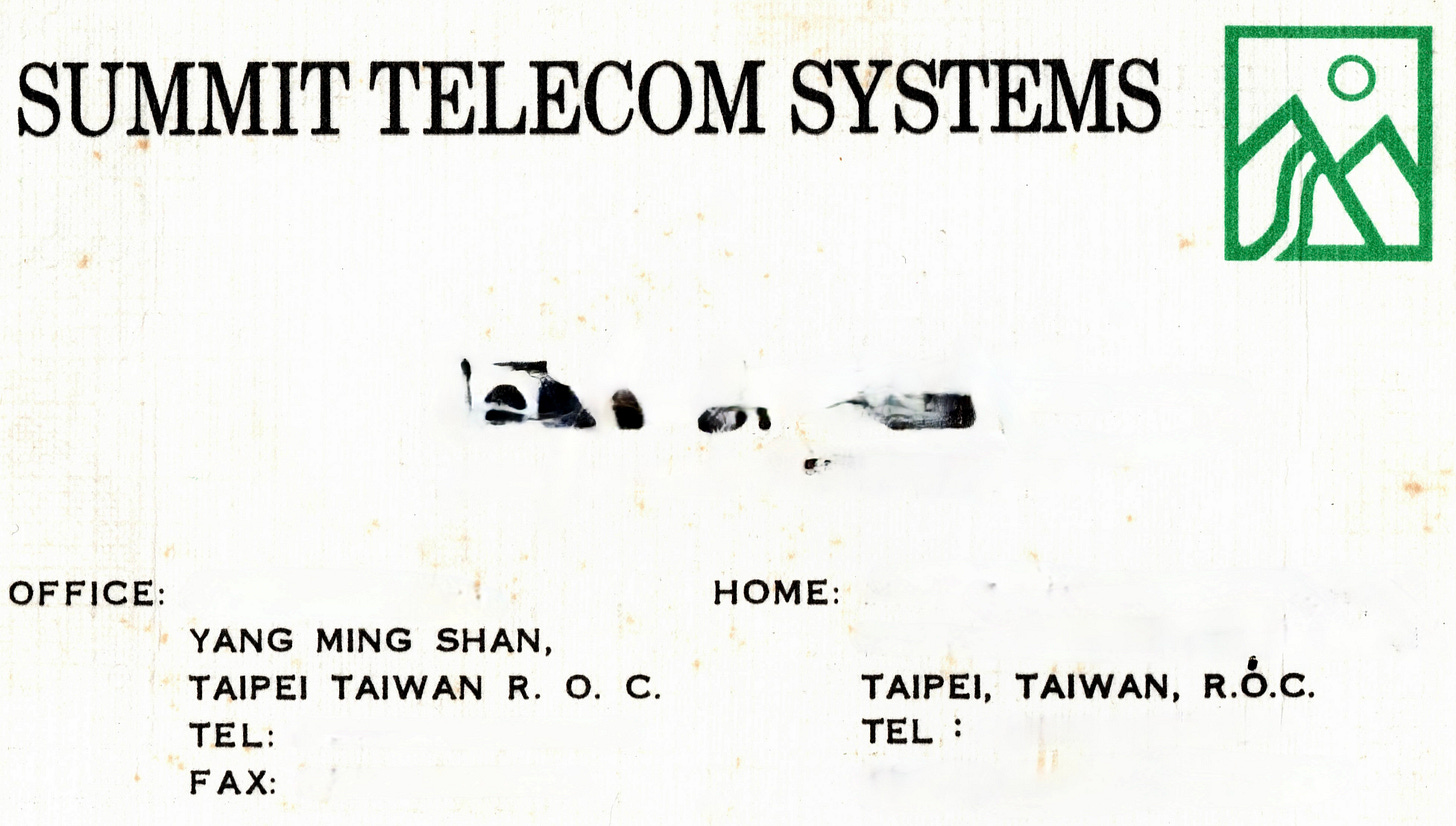
Taiwan was allowing the U.S. to eavesdrop on Chinese military radio communications. They stayed at the Riviera Hotel around the corner, and early one morning I waited in a taxi outside the hotel as they piled onto a bus to take them to the worksite. It was not hard to find:
U.S. NSA - Taiwan NSB Signal Intelligence facility on Yangmingshan Mountain. Author Photograph.
The Combat Zone was not Bangkok’s Soi Cowboy, nor Angeles City’s Santos Street, nor Singapore’s Four Floors of Whores. The Combat Zone was gaudy, idiotic, nasty. The glory days of the 1980s economic boom were a faint memory.
Though there were some beautiful barmaids, it was a red light district that actually discouraged men from procuring a prostitute. Most of them were old women with lips hanging down like an old man’s testicles. Slapping the inside of their thighs when they strutted up to you; flapping on a windy day.
By the time Stokes had stumbled upon it in 1997, it screamed chlamydia, black mold, dead rats. One pretty prostitute I met in the K9 Pub had scars on her wrists.
Each bar was next to the other in a tight fit. Each storefront as different as the next. There was the Hope and Anchor Pub, which everyone called the Hopeless Anchor. There was the Bridge Pub, nicknamed the Bridge to Nowhere. The Montana Pub with its Amazonian barmaid “Tibetan Tina”. The Manila Pub had no Filipinas. The old mamasan in the Mariner Pub had “shined shoes” back when the U.S. military was still stationed in Taiwan.
But as a journalist, the Combat Zone served as a non-stop buffet of breaking stories, first as the Taiwan correspondent for Jane’s Defence Weekly (2000-2006), then as Asia Bureau Chief for Defense News (2006-2016).
But there were no AIT cards in the stack of business cards. They were clueless about the enormity of what was happening behind their backs. The delegations drinking in the Combat Zone were brainstorming on how to change U.S. government policy and get Taiwan the weapons and training needed to fend off a Chinese invasion.
It was like a rebel group planning a coup d'état. It was rather rude, as the delegations were technically AIT “guests”. The cabal’s host was in for a frightening revelation.
Why? Stokes and crew were also conspiring to rid AIT of the contractors and return active duty military personnel; the first time since 1979. When discovered, AIT and the U.S. State Department panicked, claiming it was a red line that China would never tolerate.
Changing policy, Stokes said, was like forcing a super tanker on the high seas to turn around. It had to be done one inch at a time, he would joke. But the switch was necessary as it would allow the Pentagon to give orders without AIT ignoring them or dragging their feet. They wanted a salute and no whining.
Normally, each U.S. Embassy housed different bureaucratic cultures, regulations, and expectations among the DIA, CIA, Pentagon, State Department, etc.
Most of the restrictions that a U.S. Embassy face in interacting with local citizenry, American expatriates, and particularly journalists, involved the U.S. Security Executive Agent (SecEA) Directive. It forced Embassy employees with security clearances to identify foreign contacts under 12 FAM 273.3 to the DS Office of Counterintelligence (DS/DO/CI) via the DS-1887 form.
Taiwanese women are some of the most alluring on the planet, but the SecEA made promiscuous sex nearly impossible. Though some of the hound dogs at AIT managed without going berserk; one AIT military contractor filled out a DS-1887 every Monday.
There was also the perceived and sometimes real personal costs and consequences of regular contacts with outsiders to their careers. An old DS-1887 filed ten years prior might reveal an unsettling connection to a recent espionage scandal; even if there was no security threat all those years ago.
Particularly, if a friendship outside an Embassy later revealed itself as an attempted honey trap. Losing your security clearance, which are like “trade union cards” in Washington, means career over.
It became even more difficult to socialize after 9-11 and the related exponential rise in bureaucratic weight and muscularity of security and counter-intelligence officers.
AIT, not wanting to be left out of the security crisis, responded by canceling the 4th of July party sponsored jointly by AIT and the American Chamber of Commerce (AMCHAM) at the American School. It was moved to a much safer location along poolside at the American Club (membership required). AIT had once again earned its acerbic nickname: Assholes In Taiwan.
AIT had more than just mixed subcultures, but an additional befuddlement of career diplomatic personnel bumping heads with contractors. Then there were other policy hinderances that made AIT difficult to justify even calling itself a “de facto embassy.”
AIT had no one from the FBI or the Immigration and Customs Enforcement (ICE) branch; the U.S. Consulate in Hong Kong handled these issues for AIT. Why not? It was only a one hour flight.
The Diplomatic Security Service (DSS) had a Regional Security Officer (RSO), but many of the staff were ill-trained local hires (often alcoholics), and the RSO chief had to wear the ICE and FBI bureaucratic hats as added burdens. The cramp offices of AIT created problems unforeseen in modern U.S. Embassies blessed with reinforced fences, bombproof walls, and guards armed to the teeth. No. The old MAAG/AIT building was directly on Xinyi Road making it impossible to protect from a car bomb. On top of the problem of wearing FBI and ICE hats, the RSO serves as the “sheriff” of the embassy.
The old depilated AIT building on Xinyi Road, formerly the U.S.-Taiwan Military Assistance Advisory Group (MAAG). Author photo.
In a normal, fully staffed U.S. Embassy, the RSO has more power than the CIA/FBI/ICE. In 2009, the RSO at the U.S. Embassy in Algiers placed the CIA Station Chief, Andrew Warren, under arrest for raping two Muslim women.
But under AIT regulations, to further humiliate the RSO, they were not allowed to carry a handgun or a badge. The RSO brought in the local SWAT (Thunder Squad) to familiarize themselves with the facility and drill for different scenarios in the building.
The RSO had no choice; AIT had no internal team capable of intense anti-terrorist close quarter combat (CQC). There were no Marine Corp security guards. Just some haggard local hires that served as security guards at the doors and gates.
If the RSO was chasing his tail in endless circles, some at AIT could care less. AIT had a Public Affairs Section with a “Senior Media Specialist”, but upon calling her several times to ask to meet, she was always too busy organizing a mysterious AIT family event. It was hard to understand the lack of interest in just having coffee. Finally, in a formal letter to her, I stated my intention to file a Freedom of Information Act (FOIA) request for information. A terse response from her stated that AIT was not a government entity, but a non-profit, and that FOIA would not apply. I never saw a member of AIT’s Public Affairs Section at any of the Taiwan Foreign Correspondents Club (TFCC) functions.
Just like AIT, we did not exist. Taiwan was not a country. AIT was not an Embassy. And the TFCC was just a website with no office. Everything on the island seemed virtual.
What was not virtual was the Combat Zone.
Unlike his more reserved colleagues at the Pentagon, Stokes reveled in debauchery as spectacle; a people-watcher; a cultural anthropologist with a sense of humor. And there was no better theater in bizarre decadence than the B-52 Pub.
On Sunday, the Combat Zone swelled with Filipina maids taking their only day off. Hundreds of them flooded the area after Catholic Mass just five minutes away at St. Christopher‘s Church. In the morning they had lit a candle, prayed, confessed, and then flocked like canaries to the Combat Zone to light a different kind of candle. They only had between noon and six before they had to take a bus back to Tienmu before the curfew. Six hours to live life with an egg timer running.
Most poured into the basement of B-52.
On Sunday, the Combat Zone swelled with Filipina maids taking their only day off. Hundreds of them flooded the area after Catholic Mass just five minutes away at St. Christopher‘s Church. Most poured into the basement of B-52.
The place was named after the B-52 strategic bomber, but it reminded one more of a dank and dark diesel submarine. The place reeked of cigarette smoke, pussy fart, and spilt booze. The floors, tables, and bar were permanently sticky. The private KTV rooms were well hidden and reeked of dried semen and puke. The men’s room had a bug light that sounded like a popcorn machine. Zapping newly hatched fleas born from the cracks in the ceramic tiles; fertilized by juice dripping from broken sewer pipes. There were thousands of dead on the floor or flying in endless circles waiting their turn. Above the sink, someone had smashed the mirror with their head. The toilet seat lay upside down in a corner, ripped from the hinges.
It would take a flame thrower to clean the place. But on Sunday afternoon it was a favorite of Stokes, Wuster, and a few members of the cabal.
On the dance floor Filipinas shook their eggs loose. Some were looking for a short time before their 6 pm curfews. Adding to the dance music were the high-pitched chirpy Filipina voices. At around 3 pm, American Pie hit the speakers, a B-52 tradition. All the girls stopped dancing and broke out in chorus, some raised their cigarette lighters to sway with the music. It calmed the mood of the bar, built camaraderie, made you feel like you were part of something. A song about the loss of America’s innocence. The death of the American dream. The long goodbye. Each verse got a little louder. They loved this song. They loved the dreamy America.
The sexual energy generated in those few hungry hours attracted an odd mix of lonely male expatriates; exiled Tibetans, Sub-Saharan Africans, and English teachers, all wanting to hook-up. The girls had their choice between this Jackass or that Asshole, all alcoholics, but the girls were often not exactly beauties - more like roadkill, and when the men began fighting over it - pathetic drunks fighting over a fresh carcass - violence was the norm.
But the bar provided more than just Twilight Zone debauchery as entertainment. Many of the maids worked in the homes of AIT officials and defense contractors. For six days a week they worked these heartbreaking jobs, taking a break in between chores to text each other.
The Filipinas had an expat network that were tapped into everything happening in AIT and the defense contractor world. If one girl told us a crazy rumor, another girl could call around for ten minutes to confirm: “Yes, Mrs. X stabbed her husband, now AIT was sending them both home” or “The director was a closet-homosexual and his wife confronted him in a drunken rage in AIT’s parking lot” or “big secret in the Regional Security Office (RSO)…a big Mormon…big patriot…big CIA guy!”
Kevin Mallory was working in AIT’s RSO office as CIA cover; many moons later after retirement, Mallory found a new home at a high-security U.S. Federal Prison in Pennsylvania for spying for China. It is unclear how much classified information included Taiwan.
The girls were a goldmine of information about AIT. Who was being promoted or fired, who was always hungover at work, who was cheating on his wife; basically, where the bodies were buried.
AIT was indeed full of misfits, but most acted as if they were above it all. Not only did they behave that way, they literally were above it all. Most lived in Tienmu, a wealthy residential area, north of Taipei on a raised shelf leading up to Yangmingshan, an extinct volcano. The winds down the mountain made it cooler than Taipei. The presence of the American School, and the nearby American Club, made it cozy for homesick families. This created a groupthink world for AIT personnel. Not only did they live in a bubble, they sincerely believed they were in charge.
U.S. military delegations visiting Taiwan managed to stay out of trouble for the most part, but wild rumors eventually filtered up to AIT of debauchery, decadence, defilement. Most fantastical, impossible, even hilarious.
But some were true. One night, in the Bridge Pub, a fight broke out amongst the locals. The barmaids warned Stokes not to leave, but as fisticuffs ensued, he tried to slip out quietly. It was in vain. One of the drunks busted a beer bottle over the back of his head. AIT would only hear about the fracas and the stitches via the grapevine much later.
At one point, the rumors were too much for AIT and ordered all U.S. military delegations to consider the Combat Zone verboten. The memo only made things worse. Now everyone traveling to Taiwan wanted directions. Stokes provided them a briefing on the rules of engagement from his many reconnaissance missions into the Zone’s darker corners.
Stokes was becoming a legend.
For AIT, Stokes was not a man, but a holy terror to their peaceful world. He was elusive with no interest in their complaints. He worked with them on various projects to improve Taiwan security, but when necessary, Stokes treated AIT like mushrooms (keep them in the dark and feed them shit). His nocturnal activities with other Pentagon folks drove AIT crazy in their claustrophobic offices in the old AIT/MAAG building.
By day, at AIT and the MND, in suit and tie, Stokes was Dr.Jekyll. Then Mr. Hyde at night with the cabal. However, both personalities were intent on destroying the Kissinger legacy and reinventing it.
The State Department was the dragon, Stokes the dragon slayer, and the Combat Zone was the den of his trusty band of merry miscreants. The Combat Zone was perfect with its labyrinth of alleys, dark shortcuts, even underground off-the-books speakeasy-style bars hiding from the tax man.
The problem with AIT was sensory deprivation created in cramp office spaces in a building that was falling apart. It was a metaphor for their careers.
Many of them suggested Stokes be court-martialed, all in ambiguous terms, but there was a Catch-22.
Since Taiwan was not a real country under U.S. law and policy, there was nothing AIT could do to him. Stokes grew up in Texas and there was too much of the Alamo in him.
And, besides, Stokes had powerful allies in the U.S. government. In truth, not actually allies, but apex predators.
These included Richard Armitage who served as Deputy Secretary of State (2001 - 2005) under Bush.
With broken teeth, shaved head, and the body of a powerlifter, it was not hard to imagine that a gorilla had walked into the room. After the 9/11 attack, Armitage went apeshit on getting revenge for the attacks.
During the Reagan years, Armitage served as Deputy Assistant Secretary of State for International Security Affairs for East Asia and later as the Assistant Secretary of Defense for International Security Affairs. It was here that Armitage earned a reputation as the “enforcer” of U.S. foreign policy. Over his career, White House administrations used him to personally explain to dictators God’s plan for them if they continued misbehaving.
During the Vietnam War, Armitage was a special forces adviser to the South Vietnamese military. Later, in 1975, when Saigon fell, Armitage personally organized a fleet of vessels to evacuate civilians.
Armitage’s philosophy of life became the motto of Stokes and his cabal: it’s easier to ask for forgiveness than to get permission.
The other guardian angel was Paul Wolfowitz who served in the number two position in the Pentagon as Deputy Secretary of Defense (2001 - 2005), making him a member of the White House’s war council.
Stokes described Wolfowitz as a Velociraptor.
Above: Wendell Minnick and Paul Wolfowitz in Taipei. Author photo.
AIT also made the mistake of handing out cell phones to visiting U.S. military delegates. The same numbers would recurrently pop up on my cell phone and I quickly learned to collect them all under a group text application that would inform them of our location for boozing that night.
The 2001, $18 billion dollar, arms deal gave the cabal a reason to celebrate, but then the unbelievable happened. Internal fighting over money amongst Taiwan’s political elites stifled progress on the budget. The package was blocked by the Kuomintang (KMT) Party in the Legislative Yuan (LY) that opposed the first non-KMT elected president in the island’s history. Chen Shui-bian, Democratic Progressive Party (DPP), would serve as president from 2000-2008.
The DPP terrified the KMT old timers. And money from arms deals or nuclear power plants or whatever in the budget in epic dollar terms meant free money for the party in power. And the KMT, which had been the party in power since leaving China in 1949, had been outright stealing from government coffers for personal enrichment. the DPP was in power in the Executive, but the KMT retained power in the Legislature, and the KMT would never allow that kind of money to fall into the hands of the DPP.
Then in 2004, paradise was becoming a bit darker for Stokes. He made the mistake of reading Chin Ko-Lin’s book: Heijin: Organized Crime, Business, and Politics in Taiwan. The book was a no nonsense in-depth look at Taiwan’s “black gold” politics and relationships with organized crime, namely the local Bamboo Union.
Wuster had warned him of the connections between organized crime and the legislature.
The Taiwan political elite, whether KMT or DPP, were not interested in buying U.S. weapons to fight the Chinese unless there was a kickback or two via Offset Agreements from the U.S. Foreign Military Sales Program.
Offsets allowed members of the ruling party to siphon off enormous amounts of money for so-called legitimate local enterprises supporting the arms deal.
It got so bad, a piece of the pie was offered to myself via LY friends looking for help. The author turned down the kind offer, gently. On another occasion, a scheduled interview at the office of a LY member of the Foreign and National Defense Committee went sideways. The secretary apologized for the sudden cancelation, but the legislator had an emergency meeting at his factory in Shenzhen, China.
Over my tenure at Jane’s Defence Weekly and Defense News, bribes, including prostitutes, were on offer. Before any “business” meeting or dinner, I started wearing my Eagle Scout ring as a reminder to behave.
Conflicts of interest were getting harder to ignore, but there was nothing the U.S. could do to lecture Taiwan on how to behave. After all, the U.S. abandoned Taiwan in 1979 to fend for itself. It had virtually no allies except a few African and Central American despots. Pacific Island nations would use dollar diplomacy to switch relations between China and Taiwan, back and forth for decades.
Later a Taiwan government document listing all of Taiwan’s sales agents and the corresponding foreign defense companies began circulating. The list showed conflicts of interest amongst Taiwan sales agents and the U.S. companies they worked for. It was later published into book format and gave everyone in the industry and government a look at how local sales agents would conspire together to win and/or lose contracts based on the highest available payout.
Even though the cat was out of the bag with Heijin and other revelations and scandals, some sales went forward, such as the Kidd-class destroyers. In November 2002, the U.S. released the Kidd notification of the pending sale.
However, it was not until 2007 that the KMT controlled LY, confident it could win the upcoming presidential election, passed a defense budget for the 2001 items: P-3C planes, PAC-2 upgrades, F1-16C/D fighter mid-life upgrades.
In celebration of the 2002 Kidd announcement the cabal celebrated in the Montana Pub in the Combat Zone with the usual cabal members: Mark Stokes, Fu Mei, and Taiwan Navy Captain Winston Li (李豫明), amongst others that will go unnamed.
Fu Mei was a Taiwan expatriate who created the Taiwan Security Analysis Center (TAISAC) and the Taiwan Defense Review (TDR). His influence behind the scenes was incalculable. His outlets, TAISAC and TDR, were unknowns to Western journalists in Taipei, except myself, and his combination of analysis, networking, and complete dedication to saving Taiwan matched few others in the cabal.
However, it was not the usual cabal evening. This time we were not alone.
A surveillance team of two military intelligence officers were sitting across from the group on the other side of the U-shaped bar photographing everyone. Someone in Taiwan’s intelligence community was unhappy with Stokes’ antics and wanted to know who was part of the cabal. Winston was the Chief of the International and Protocol Affairs Section of the Office of Naval Intelligence (N2). The Chief had a job to do, but under very restrictive conditions, most of which made his fraternization with foreign government personnel and journalists taboo.
Like Stokes, Winston was an outlier. But unlike Stokes, he was also a bulldog that had gone completely rogue. His commander called him into his office with the photographs spread out on the desk, screamed at him for a while, and reassigned him to the Naval Intelligence’s Weather Bureau as punishment. He was lucky, many of the upper echelon of the military wanted him court-martialed. He did not care. No one could bribe, badger, or berate Winston.
Taiwan Navy Captain (N2) Winston Li (李豫明) at the December 2005 commissioning of the Kee Lung (基隆, DDG-1801), formerly the Kidd-class Destroyer. Author Photograph.
And so the delegations came and went. Bouncing in on the United Airlines flight on a Friday evening around 21:00, hitting the hotel down the street, then strolling up to the Combat Zone.
Then in 2004 it was over, Stokes retired from the military. Prior to leaving, OSD grudgingly promoted him to Lieutenant Colonel; it is normally not Pentagon tradition to reward outliers.
Stokes could have stayed in DC. Wrangled a lucrative defense consultancy. Instead, Stokes got on airplane and flew to Taiwan. His obsession had not waned. His demons demanded more.
Upon returning, in 2005, one of his obsessions came to fruition. The Pentagon’s DIA and other U.S. military offices began filling billets with younger, more ambitious, U.S. military officers as the contractors were slowly kicked out the door.
In 2005, the DAO at AIT minted a challenge coin to celebrate the transition from contract civilians serving as U.S. defense attachés and the return of active-duty defense. Designed by former acting U.S. navy attaché (Deputy Chief - 2001-2005) Michael McCallus. The coin below was presented to me in 2006 by U.S. Army Attaché (Deputy Chief and Senior Advisor & Army Affairs Officer) Brad Gerdes.
Gerdes had already made a name for himself across the Taiwan Strait when he was one of the first U.S. DAO officers arrested and expelled from China for “espionage” in 1995. Now, just ten years later, Gerdes was getting revenge.
Above: AIT’s Defense Attaché coin based on the China Service Medal for both U.S. Navy and U.S. Marine Corp – World War Two (Below).
Below the flip side of the AIT coin shows the original Flying Tigers (American Volunteer Group) emblem from World War Two, combined with the original shield from the U.S. China Burma India (CBI) Theater Emblem.
US China Burma India CBI Theater Emblem.
The Flying Tigers under General Claire Chennault would later be revamped as a private company called Civil Air Transport (CAT). CAT used cargo aircraft to resupply KMT Nationalist forces fighting the Communists in the late 1940s. Close to bankruptcy by the end of the Chinese Civil War, the CIA procured the airline a few months before the start of the Korean War.
Chennault remained in charge of CAT until his death in 1958. It expanded into different CIA fronts: Air Asia, Air America and Southern Air Transport. Air Asia, headquartered at Tainan Air Base on the west coast of central Taiwan, was heavily involved in the Vietnam War, including Laos via Air America. Hollywood captured some of the nostalgia of the old Air America in a movie and the alumni association continues having reunions.
After Air America was shuttered shortly after the fall of Saigon in 1975, the U.S. suffered a catastrophic military rescue attempt in 1980 during the Iran hostage crisis. Afterwards, the U.S. military created the 160th Special Operations Aviation Regiment (SOAR), the “Night Stalkers”, for all clandestine air operations. They first came to public attention with the movie Blackhawk Down and later were the air component of the raid on Osama bin Laden’s compound in Pakistan (see: Zero Dark Thirty).
In the early 2000s, a member of SOAR was sent to Taiwan to evaluate Taiwan’s 601/602 Army Aviation Brigades, under the Army Aviation and Special Forces Command. He joined Stokes and crew in the Combat Zone to discuss his findings. A visit by SOAR before Stokes’ 1997 appointment would have been impossible.
Things had changed under Stokes and his cabal of troublemakers. AIT never had control of him, the Taiwan military did not know what to think of him, and his cabal with their brainstorming sessions in the sleazy Combat Zone were totally unauthorized. It did not take a Kissinger clone and a bunch of prissy Ivy Leaguers to wonk-on about China on CNN to change the world.
It took piss and vinegar.
Above. Wendell Minnick at an artillery exercise in southern Taiwan. From 2000 to 2010, access to military sponsored media trips to airbases, naval facility, missile silos, etc., went from monthly to weekly events. Author photo.
End of Part Two; PART ONE




